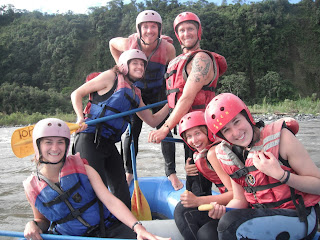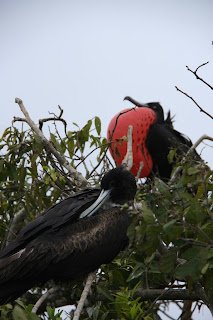After traveling the last two years, I can say that I was exposed to very foreign environments in every country I visited, even the modern countries like Korea and Japan (and even European countries that I visited in college). But of course there is something special to being somewhere that adds an economic foreignness (and yes, foreignness is a word!) to the cultural foreignness. In Cambodia, Malaysia, Peru, and Ecuador, I was exposed to and met people who have never known the kind of wealth I have lived with, and probably cannot even fathom such wealth. Let's take a look at a few stats provided to me after a few minutes of research on wikipedia:
- Cambodia is currently ranked as the poorest country in Asia, with the average Cambodian making $2,400 per year (what I made in a month in South Korea).
- One-third of the Peruvian population is considered "poor", with 10% living in poverty.
- 17% of Ecuadorians live in poverty
- Approx. 21% of Malaysians live in poverty
Through my travels in these countries, I did see poor people. I saw one-room homes made out of cheap wood and corrugated metal that housed families of 12. I saw people living in homes with dirt floors. I saw communities with little electricity and poor plumbing. I saw children with filthy faces and tattered clothes. These people were living in conditions that I do not wish to live in. I like my nice, stable home with plenty of electricity to power my laptop, cell phone, iPod, e-reader, several lamps, fan, and air conditioning all at the same time. I like hot showers and plumbing that is strong enough to handle the flushing of toilet paper. I like being able to throw my dirty clothes into a big, white box and have it wash my clothes better than my own hands can.
Something shocking occurred to me, though, that surprised me about these third-world countries. It wasn't the fact that I never dealt with greedy, corrupt police (a pleasant surprise, though I am aware that it happens in many countries), or that I nor my travel companions were never victims of any crime (I have heard accounts from other travelers in the same countries, but theft seemed just as prevalent as it is in any European city). The surprise was that these poor people don't seem to need much. Or maybe they don't need anything at all. Even though these people were living in conditions I would consider rough and unfavorable, they were not hungry (compared to 15% of Americans who are "food insecure"), they were not homeless (very rarely did we see beggars on the streets, nothing compared to any American city), and they were not lacking family. They didn't even seem to be lacking happiness (the people of Cambodia and Malaysia seemed an awful lot happier than South Koreans, who hold one of the highest suicide rates in the world) or basic education (93% of Peruvians and Ecuadorians and 88% of Malaysians are literate). And with the exception of people living in remote areas, they are provided with affordable health care (something millions of Americans are without). Most people even seen to have cell phones!
So these observations made me think, and are still making me think, about the ideas of poverty and wealth, about family, about what we need compared to what we want, and about technology and whether its advancements do equal better living. Are our lives better than those in Cambodia because we have smart phones and the internet at our disposal and 1,000 channels on television? One could argue that we have more access to all the world's knowledge because of this, but let's be honest, we're not exactly taking advantage of that, are we?! America also grows enough food to feed the country several times over, and yet 15% of the population is not properly fed, compared to the Peruvians and Ecuadorians who all seem healthy and well-fed (the Inca Empire was one of the very few civilizations in the world's history that was able to eradicate hunger, something that seems to continue today).
I'm not trying to argue that life in those countries is better than in the U.S., or that poverty in those countries is not still a hard life. But I am saying that maybe aspects of their lives is better than ours. Maybe it's worth noticing that they seem to value family more than us; that although very few of them are rich, they are not starving and homeless; that although they do not have the technology we have, they don't seem any less happy.
One last thing that has been on my mind over the last few months is the power of choice. Growing up in America, in my family, I was given the incredible gift of choice to do whatever I want with my life. If I wanted to be an engineer, a doctor, a musician, a businessman, I could (and still can) study for these occupations and work my way towards a career. If I want to live in the big city, I can. And if I want to live in the countryside, I can. However, many people in the world are not given this gift. Many people are born into an occupation, or are born into a region that they will never be able to leave. I know for most people of my culture and society, that sounds like a lifelong imprisonment. But then I wonder about this gift we are given, and I am starting to think that maybe it's a double-edged sword. Although I am so grateful that I have been able to choose a career for myself out of the endless list of occupations available, I also look at my peers in my generation, and I realize that this seems to be a generation and an era of indecision. I look at how many of my friends and peers have college degrees and no idea what to do with their lives. How the average college student changes their major four times. How we can have 1,000 channels available to us on television, but not find what we want to watch. How presidential candidates will campaign for 18 months and people will still be unsure of who they will vote for. Or the fact that there is always something bigger and better than what we have so we cannot be satisfied with our current belongings. How often do we find ourselves in a "crisis" because we cannot choose between two great things available to us? Talk about first-world problems!
Millions of people around the world are not given nearly as many choices as us, and in many situations are given only one choice. They're going to be a farmer, they're going to marry this woman, they're going to live in this town, and that's that. These may not be things they prefer, but they deal with it, and they are still capable of being happy. And hey, they never have to deal with the stress of deciding! Now all of that being said, if someone offered to take away my power of choice, I'd say "Hell no!" But what I have come to realize is that our world (the first-world) is not universally better than theirs (the third-world). We don't have it all right while they have it all wrong. Our lives aren't necessarily any happier than theirs, or more fulfilling, or healthier. Everything is relative. If we were put in a third-world environment and told to live like those people, it would be very, very hard for us, and probably very unhappy, because we would have things we like taken away. But those people born into such environments find happiness, they manage to smile everyday. And it's because it's what they know. Just as people 100 years ago were able to be happy without electricity and appliances and fast transportation because they were living in the best conditions they knew, people in poverty today are in a similar situation.
Before I conclude my thoughts, I want to make it clear that I do still believe there is real poverty in the world, poverty that entails homelessness, starvation, disease, and illiteracy. And those poverty-stricken communities should be helped and supported by the global community. But the purpose of sharing this entry with you all is to say that my travels have shown me that money does not equal happiness, that technological advancements do not equal progress, and that the privileged lives we live in the first-world are not necessarily better than other lives in the world. I have become more aware that some things in my life are not necessary for my happiness. At the same time, I have become a lot more appreciative of many "little" things in my life, like hot water, internet access, and strong plumbing.


























